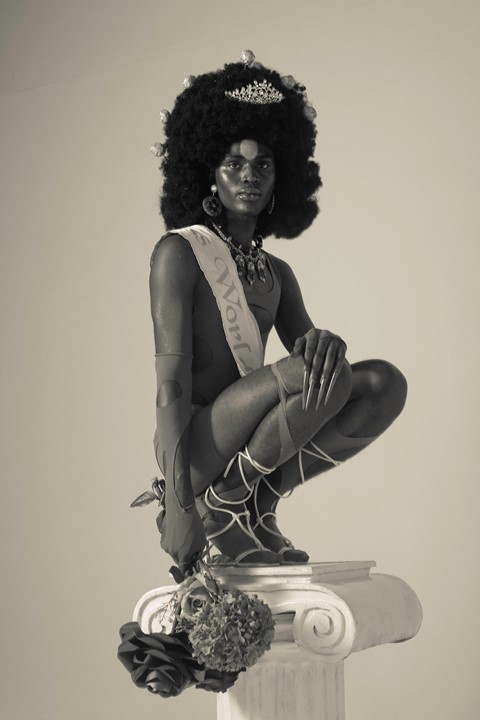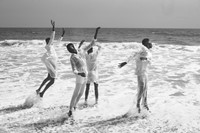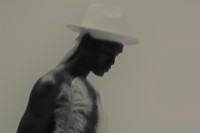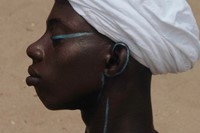“My goal as an artist is to use my work as activism,” the Lagos-based creative tells AnOther, as a digital curation of his photography continues at Homecoming Gallery
Lagos-based stylist, photographer and director Daniel Obasi is the subject of a new exhibition at Homecoming Gallery, exploring the essence of identity and sexuality through his personal lens and the societal viewpoints of his native country, Nigeria. Curated by Azu Nwagbogu, founder of the African Arts Foundation and Lagos Photo festival, the special project showcases a variety of Obasi’s work, from his signature self-portraits to ethereal photos of friends, styled with his artistic instinct. It’s the same talent the African creative used to style Beyonce’s 2020 film Black is King and Burna Boy’s recent Rolling Stone cover, among countless other editorial shoots.
“My goal as an artist is to use my work as activism,” Obsai tells AnOther. “I want my visuals and my ideas to explore the stories I want to tell. That’s always the most important thing.” His work often dissects power structures within society and the ways in which manhood and self-expression are depicted in Africa by drawing on his own realities. “Everything comes from a very natural place. I live in Nigeria, these are my experiences, my collaborators and the people I work with are my friends,” he says. “At the very root of all we do, you can see the themes and the ideas that we’re exploring are based on problems and issues we’re dealing with as a society or things that we want to see a change in.”
A standout piece from the exhibition, and one that holds special significance for Obasi, is an image of a muse on a pedestal titled Corridors of Power. “That portrait really encapsulates where I am in my career right now as a photographer who is trying to move between art and fashion to say something,” he says. The portrait brings to life the metaphorical concept of cards of power and who holds them. “It represents how decisions that impact a huge populace are made in this small corner by a select group of people. Their decisions have a ripple effect on the lives of so many, be it the US abortion laws taking place right now in the States or other legislations and acts of political violence rooted in misogyny, homophobia, racism or misunderstandings on what they believe religion to be,” he adds. Dismantling these notions and uplifting those who are marginalised by them, not only in Africa but around the world, is what he wants his body of work to represent.
Obasi’s interest in art and visual escapism is something he has carried with him since childhood. He started his career as a fashion stylist, but growing up, it was local literature that inspired him more than household designers or haute couture runways. He’d get lost in the imaginative worlds of sci-fi comics and fantasy novels and spend hours discovering the works of local writers. “I love literature, especially local literature. I used it as a way to escape reality as a child. Getting lost in a story that isn’t necessarily your story, but that you can connect with, is so special,” he says. “Being able to identify that you have felt that feeling before, the loneliness or the need for self-expression, that’s where I found my purpose.”
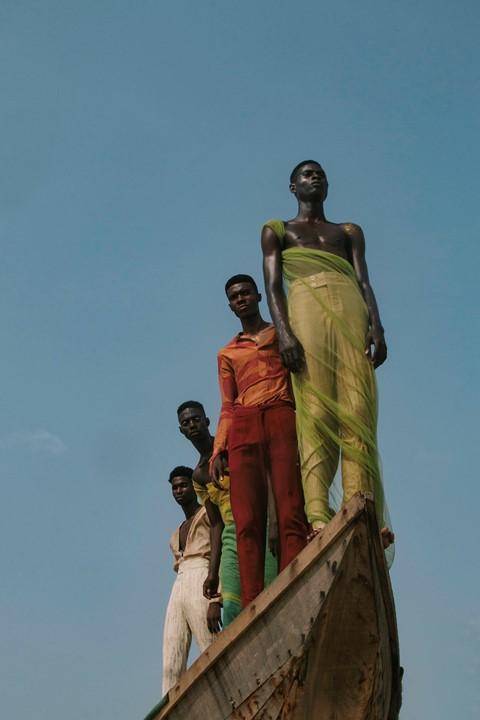
Despite starting off as a fashion stylist, Obasi has become especially known in and around Nigeria for his self-portraits. “When I take self-portraits it’s kind of like performance art. I become another character, almost like I’m using the opportunity to free myself of my own personal inhibitions and feel beautiful in that,” he says. He has spent the past few years honing in on his craft as a visual artist and director that combines his satirical background with sculptural symbolism, documenting the mundane in a way that is unique to him. “Working in fashion, I always felt like my work wasn’t what you’d expect from a stylist. I always wanted to weave in ways to explore artistic concepts. People would tell me that my fashion work was too artsy and then others would say my artwork was too fashion. So I decided to have that be my own voice and combine the two.”
Among a new generation of fashion, music and art talents rising from Africa, Obasi has a front-row seat to the creative revolution taking place on the continent – in fact, he saw it coming before most. “None of us here in Africa were trying to create this huge explosion of international acclaim with fashion or music or anything. We were just expressing ourselves the way we always have done and because of the talent we have here. The only difference is that before social media, we had nowhere to showcase it. We didn’t have access to a lot of print magazines or huge digital platforms but as soon as that came into play, it gave people access,” he explains. “We always knew our time would come, it was just a matter of when, and this is it.”
See Daniel Obasi’s Homecoming Gallery spotlight here.
